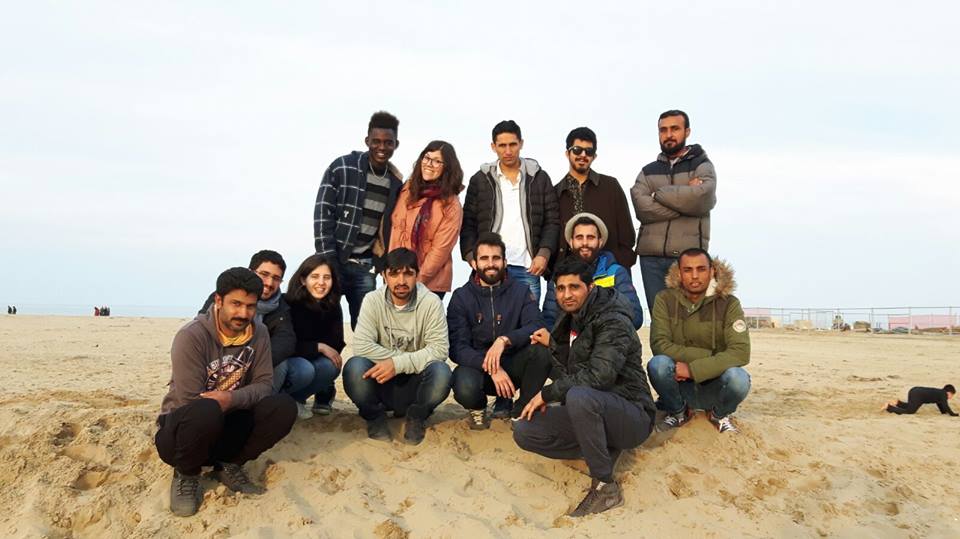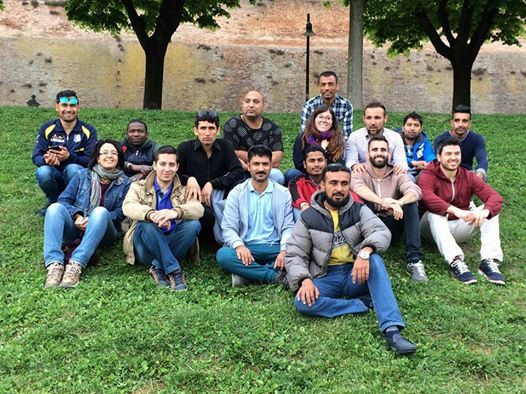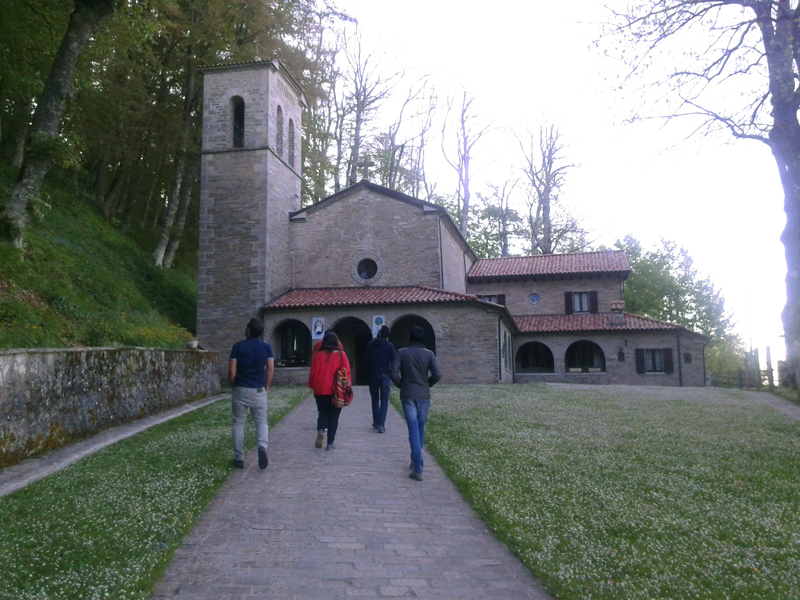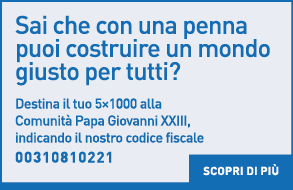SVErienze
volontariato europeoScritto da Jonathan Hernandez Henriquez, volontario S.V.E. presso Associazione Comunità Papa Giovanni XXIII
IT
Da quattro mesi sto vivendo e lavorando a CasaMondo, una struttura di accoglienza in una zona rurale della provincia di Rimini, in Emilia Romagna, dove vivono circa 16 migranti richiedenti asilo, in attesa di un documento che permetta loro di vivere in Italia.
In questo piccolo paese, San Savino, circondato da polli, cipressi e tazze di caffè, ho cercato di fare il possibile per portare un po’ di supporto logistico all’Associazione Comunità Papa Giovanni XXIII, responsabile del progetto SVE. Il mio contributo si è tradotto nella progettazione e redazione di diverso materiale promozionale e di sensibilizzazione, nello svolgimento di diversi laboratori di Intercultura nella scuola pubblica e dando una mano nella struttura di CasaMondo.
Vivere in mezzo a questa torre di Babele è stato come bere all’istante un cocktail di lingue, città, culture, progetti, idee e persone incredibili. Ma l’orologio non si ferma. Sono giunto a metà strada e continuo ad avere la sensazione di essere arrivato ieri. Il tempo sta volando. Quindi, qual è il bilancio di questa follia chiamata SVE?
a) pazienza.
Il Servizio volontario europeo è un piano di educazione non formale: tutto ruota intorno a sperimentare in prima persona una realtà diversa, imparando per tentativi ed errori. Va al di là di parlare un’altra lingua o adattarsi al ritmo di un’altra cultura: alla fine, si tratta di tirar fuori il meglio di te stesso e di essere aperto a tutti i tipi di situazioni e personaggi, alcuni grandi e alcuni meno grandi.
Nel mio caso particolare, condivido la casa con i ragazzi richiedenti asilo, persone che vivono una situazione di disagio sociale data da lontananza culturale e linguistica, dall’esistenza di pregiudizi nei loro confronti e dalla lontananza dagli affetti familiari. Le attività che portiamo avanti con loro sono necessarie ma non mi sembrano mai abbastanza.
Sono persone senza una chiara prospettiva per il futuro, che vivono giorno dopo giorno in attesa di una Commissione di identificazione, un permesso per vivere in dignità, in regola. E come ogni situazione stressante in cui vivono persone, e non robot, sorgono tensioni e conflitti che non possono essere cambiati da un giorno all’altro, tra cui alcuni problemi che non possono essere risolti per niente.
Condividere questo tempo con loro mi ha insegnato che non tutto può essere organizzato, ci sono cose per le quali non esiste una risposta rapida, ed è proprio per questo che con il tempo ho imparato ad apprezzare le persone, non solo per quello che possono diventare, ma anche così come sono ora, anche con difetti e imperfezioni.
b) coraggio.
Ci vuole fegato per andare in un paese di cui non si sa quasi nulla. Ci vuole faccia tosta per accettare l’invito di un insegnante a seguire una classe di studenti senza sentirsi all’altezza. Ci vuole determinazione a cadere con stile e ridere di te stesso quando hai preso un granchio. E ci vuole coraggio per cambiare gli atteggiamenti e agire. Gran parte di questo programma si basa su esplorare, innovare, e sporcarsi le mani, per quello che ci vuole coraggio. In caso contrario, tutte le opportunità di evoluzione sono sprecate.
Fortunatamente per tutti, il coraggio è una cosa contagiosa. Ho trovato qui molte persone che non si fermano alle parole ma che arrivano ai fatti, che vivono in modo nonviolento, insegnano a scuola a pensare in modo critico e che rivendicano concretamente i diritti delle persone. Sono persone normali, non eroi o martiri, e questo è il motivo per cui la mia esperienza in Italia si sta dimostrando eccezionalmente ricca.
c) comprensione.
Ogni volta mi rendo conto di più che la nostra vita di generazione ultra-connessa è condizionata da strutture mentali estremamente povere, scarsa memoria e poca o nessuna visione del resto del mondo in cui viviamo o del futuro. Ma allo stesso tempo sono convinto che tutto questo non sia scritto nella pietra, si può cambiare, dobbiamo solo esserne consapevoli. Abbiamo già gli strumenti per connetterci con la realtà, essere coinvolti in forma lucida e onesta con gli altri e per costruire valori interni duraturi e profondi. Non è facile (perché nessuna cosa veramente importante lo è) esige tutta l’immaginazione, energia e costanza che uno ha.
In parole povere, fare volontariato a CasaMondo mi sta costringendo a mettere in discussione aspetti di me che ritenevo giusti e addirittura indispensabili e valutarli in una nuova prospettiva, che altrimenti non avrei potuto sperimentare, e questo lo apprezzo. Mi sta dando per 6 mesi una nuova lingua e una nuova terra, e soprattutto l’opportunità di aprire gli occhi al mondo, crescere come persona e incontrarmi con le vite di altre persone che lavorano per la pace e la solidarietà quotidianamente. Mi sento fortunato per questo, e invito chi ne avesse la possibilità ad assaggiare quest’esperienza.
EN
EVSperience
I’ve been working for more than four months in CasaMondo, a reception center in a rural area of the Province of Rimini in Emilia Romagna, living also there with 16 asylum seekers waiting for a document that may allow them to live in Italy for two or five years.
At this small town of San Savino, surrounded by chickens, cypresses and cups of coffee, my mission has being to bring some logistical support to the Association Papa Giovanni 23, responsible for the project, with the design of different types of promotional materials, the development of various activities in the public school and just helping out around the house that we share.
Living in the midst of this Babel has been like drinking all of sudden a strong and intense mix of languages, cities, cultures, projects, ideas and amazing people. But the clock doesn’t forgive. I’m halfway through the project, and I keep having that feeling of being arrived just yesterday, while the hands of the clock keep ticking. So, what have I learned out of this madness called SVE?
a) patience.
The European Voluntary Service is a non-formal education plan: everything revolves around experiencing first-hand a different reality, learning by trial and error and such. It goes above and beyond speaking other language or adapting to to the rhythm of another culture: in the end, it comes down to bring out the best of yourself and be open to all types of situations and characters, some great and some not so much.
In my particular case, I have lived most of the time with asylum seekers, people living at a precarious social situation at best by culture and language, by society’s fears and prejudices, far away from their loved ones in a strange land. The activities we carry with them are necessary, but barely enough. They live one day after another waiting for an identification from the Commission, a permit to live in dignity, in order. And like any stressful situation in which people, and not robots, live, there are tensions and conflicts that can not be changed overnight, including some problems that can not even be solved whatsoever.
Sharing this time with them has taught me that not everything can be arranged, there are things for which there is no quick answer, and that is why we must learn to love people, not only for what they could eventually become, but also as for what they are now, with their flaws and imperfections.
b) courage.
It takes guts to move into a country of which you know almost nothing. It takes guts to be in charge of a work team. It takes boldness to fall with style and laugh at yourself when you’ve messed things up. And it takes courage to change attitudes and take action. Much of this program is based on exploring, innovating, and getting your hands dirty, for what courage is needed. Otherwise, all the opportunities for evolution are wasted.
Fortunately for all, courage is a contagious thing. I found here a lot of people that far away from preaching non-violence, awareness and solidarity on the couch, gives example living in a nonviolent way, teaching in school to think critically and rioting for the rights of others on the road. They are ordinary people, not heroes or martyrs, and this is why my experience in Italy is proving to be exceptionally rich.
c) understanding.
Every time I realize more and more that our life of ultra-connected generation is conditioned by extremely poor mental structures, poor memory, and little or no vision of the rest of the world in which we live or of the future. But at the same time I’m convinced that none of this is written in stone, we just need a little conscience. We already have the tools to connect with reality, being involved in lucid and honest way with others and to build lasting and profound internal values. Not easy to do, nothing truly important is: it demands all of your imagination, energy and perseverance.
Put simply, volunteering in CasaMondo forced me to judge aspects of me that I thought were right and even essential in my live, and put them out in a new perspective, one I think might otherwise never have noticed, and that is always appreciated. It’s giving me a new language and a new earth, and over all the opportunity to open my eyes to the world, to grow as a person and to meet with the lives of other people working for peace and solidarity on a day basis. I feel lucky for that, and I strongly reccomend to anyone thinking about this to try it out.
ES
SVEriencias
Hace ya cuatro meses que estoy viviendo y trabajando en CasaMondo, una estructura de acogida en una zona rural de la Emilia-Romaña donde conviven unos 16 migrantes solicitando asilo político, a la espera de un documento que les permita vivir en Italia.
Durante este poco tiempo compartido en San Savino, entre gallinas, cursos y tazas de cafe, he intentado ayudar en lo posible a los chicos y aportar un poco de apoyo logístico a la Asociación Papa Giovanni 23, responsable del proyecto, diseñando material promocional, desarrollando diversas actividades en la escuela pública y echando una mano en la casa que compartimos.
Vivir en medio de esta torre de babel ha sido beberse de un tiron un cóctel de lenguas, ciudades, culturas, proyectos, ideas y personas increibles. Pero el reloj no perdona. Estoy a mitad de proyecto, y sigo con la sensación de que llegue ayer, y de que me toca partir mañana. Asi que, cual es el balance de esta locura llamada SVE?
a) Paciencia.
El Servicio de Voluntariado Europeo es un plan de educacion no formal, todo gira entorno a experimentar de primera mano una realidad distinta, aprendiendo por ensayo y error. Va mas alla de hablar en otra lengua o adaptarse al ritmo de otra cultura: al final, se trata de aportar lo mejor de uno mismo y estar abierto a todo tipo de situaciones y personalidades, algunas geniales y otras no tanto.
En mi caso en particular, he convivido la mayor parte del tiempo con refugiados, apartados por cultura, lengua y prejuicios del resto de la sociedad, y por espacio y guerras de la familia. Gente sin una clara perspectiva de futuro, viviendo un dia tras otro a la espera de una comisiòn, de una identificaciòn, de un permiso para vivir dignamente, en regla. Y como toda situaciòn estresante en la que conviven personas, y no robots, surgen tensiones y conflictos que no se pueden cambiar de un dia para otro, incluso problemas que directamente no se pueden solucionar.
Compartir este tiempo con ellos me ha ensenado que no todo se puede arreglar, que hay cosas para las que no existe una respuesta rapida, y que precisamente por ello debemos aprender a amarlas no solo por lo que pueden llegar a ser, sino tambien por lo que son ahora, con sus defectos e imperfecciones.
b) Coraje.
Hace falta valor para ir a un pais del que no sabes nada. Hace falta valor para hacerse responsable de un equipo. Hace falta valor para caer con estilo y reirse de uno mismo cuando se ha metido la pata hasta el fondo. Y hace falta valor para cambiar de actitud y pasar a la acciòn. Buena parte de este programa se basa en explorar, innovar, y ensuciarse las manos, para lo que hacen falta agallas. De lo contrario, todas las oportunidades de evolucion se quedan en nada.
Por suerte para todos, el coraje es una cosa contagiosa. Aqui he encontrado mucha gente que lejos de predicar desde el sofà la no- violencia, la conciencia critica o la solidaridad, vive de forma no violenta, ensena en la escuela a pensar de forma critica y se manifiesta por los derechos de otros en la calle. Son gente normal y corriente, no heroes ni martires, y precisamente por eso mi experiencia en Italia esta resultando ser excepcionalmente rica.
c) Comprensiòn.
Cada vez me doy mas cuenta de que nuestra generaciòn ultra-conectada vive condicionada por estructuras mentales extremadamente pobres, una memoria escasa y poca o ninguna visiòn del resto del mundo en que vivimos o del futuro. Pero si en algo me ha cambiado esta experiencia es en el convencimiento de que nada de eso està escrito en piedra. Tenemos ya las herramientas para conectarnos con la realidad, para implicarnos de forma lucida y sincera con otros y para construir valores internos duraderos y profundos.
Dicho de forma simple, el voluntariado en CasaMondo me ha obligado a juzgar aspectos de mi mismo que juzgaba correctos e incluso esenciales bajo una nueva perspectiva que no creo que pudise haber obtenido de otra manera. Y eso siempre se agradece.
Me dio un nuevo lenguaje y una nueva tierra, y sobre todo me ha dado la oportunidad de crecer como persona. Soy muy afortunado.



